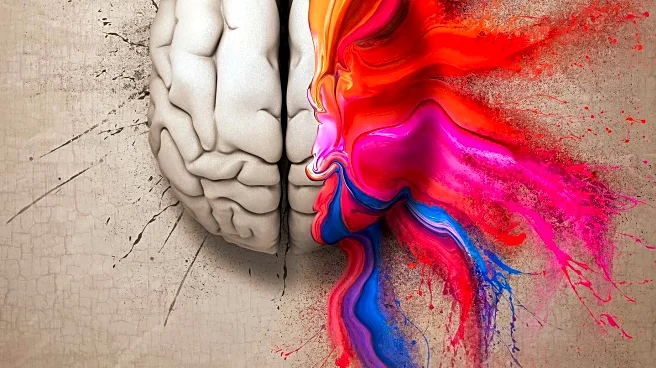What's Happening?
A recent study has investigated the effects of creative experiences on brain health, focusing on how activities such as dance, music, visual arts, and gaming can influence brain aging. The research involved 1,467 participants from various global regions, examining their expertise in creative domains and the subsequent impact on brain function. The study utilized EEG and MEG recordings to assess brain activity and connectivity, revealing that creative activities can enhance brain health by improving functional connectivity and cognitive processes. Participants were categorized based on their expertise in tango dancing, music, visual arts, and gaming, with findings indicating that these activities can lead to significant improvements in brain function and potentially slow down brain aging.
Why It's Important?
The study highlights the potential of creative experiences to positively impact brain health, suggesting that engaging in activities like dance, music, and gaming can enhance cognitive function and delay brain aging. This has significant implications for public health, as it suggests that promoting creative activities could be a viable strategy for improving mental health and cognitive longevity. The findings could influence policy decisions regarding education and health, encouraging the integration of creative arts into curricula and therapeutic practices. Industries related to arts and entertainment may also benefit from increased interest and investment in creative activities as a means to support brain health.
What's Next?
Further research is needed to explore the long-term effects of creative experiences on brain health and aging. The study suggests that future investigations could focus on the specific mechanisms through which creative activities influence brain function and how these can be optimized for therapeutic purposes. Additionally, there may be opportunities to develop targeted interventions that leverage creative experiences to enhance cognitive health in aging populations. Stakeholders in education, healthcare, and the arts may collaborate to design programs that incorporate creative activities as a means to promote brain health and cognitive resilience.
Beyond the Headlines
The study opens up discussions on the ethical and cultural dimensions of promoting creative experiences for brain health. It raises questions about accessibility and inclusivity in arts and gaming, emphasizing the need for equitable opportunities for all individuals to engage in creative activities. The research also suggests a shift in cultural perceptions of gaming, recognizing its potential benefits for cognitive health rather than viewing it solely as entertainment. Long-term, this could lead to broader acceptance and integration of creative experiences in health and wellness strategies.










